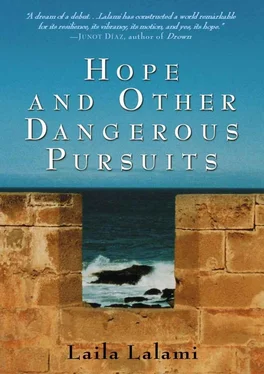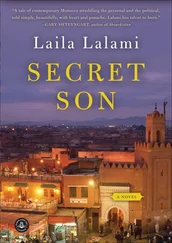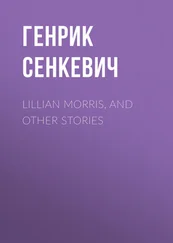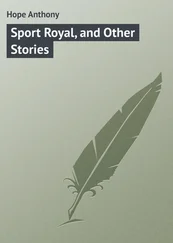Soon Aziz saw Zohra walking up the street, arm in arm with her friend, a tall, thin woman in a yellow jellaba that made her skin look darker, the color of toasted almonds. She had long, brown hair, and eyes that sparkled with insouciance. They pulled out chairs for the women, and Zohra introduced her friend as Malika. Zohra’s gray-brown eyes looked beautiful under the afternoon light, but Aziz forced himself to pay attention to Malika, to the matter at hand. “So, you work with Zohra,” he said.
“Yes,” Malika said. She smiled, revealing a gap between her front teeth.
“How do you like it there?” Aziz asked.
“It’s okay, I guess,” she said, turning to look at Zohra, as if for confirmation of the uninteresting nature of their occupation.
“She’s good,” Zohra said. “She can check the rims a lot faster than I can.” Their drinks arrived, and again Aziz insisted on paying.
Lahcen still hadn’t said a word, and in fact had begun surreptitiously picking his nose. Aziz nudged him to stop it. “Do you live around here?”
“No. I live in Derb Gnawa,” Malika said, taking a sip from her orange juice.
“My friend is in Derb Talian, so it’s not very far,” Aziz said. He turned to look at Lahcen, making it clear that he was waiting for him to say something, but Lahcen stirred the sugar in his second cup of coffee and drank it all in one gulp.
This is hopeless, Aziz thought. Nevertheless, he felt he should try again. “Lahcen was just telling me about a new Egyptian movie playing at the Star Cinema.”
Malika looked at Lahcen, as if waiting for him to say something, but instead he took out another cigarette and lit it. Malika finished her juice, twirled her straw between her fingers. There was a long, awkward silence, and then Zohra got up and said that they should be on their way.
“So, what do you think?” Aziz asked.
“About what?”
“About Malika, of course.”
Lahcen shrugged.
“I think she’s cute,” Aziz said. “And …” he made a gesture as though he were weighing melons.
Lahcen laughed. He put out his cigarette in the ashtray. “Not my type,” he said.
“Well, if you told us your type maybe we could set you up.”
“Don’t you know?” he asked, his voice suddenly raised. “I don’t want to be set up.”
“Fine,” Aziz said.
They lingered in their chairs, watching the sun set over the horizon, the sky changing into shades made even more colorful by the layers of smog over Casablanca. “What about tae kwon do?” Aziz said. “Are you going to try it?”
“We should leave,” Lahcen said, standing up.
“Look, I’m sorry.” Aziz took his friend by the arm. “Please sit down.”
Lahcen took his seat, reluctantly.
“What are you going to do?” Aziz asked.
Lahcen shrugged. “Nothing.”
The waiters had come out to turn the terrace lights on. Slowly, mosquitoes gathered around the bulbs, starting a dance of irresistible attraction.
“What if your parents find out about you?”
“Maybe they already know.”
They walked slowly back to the bus stop.
ON THE MORNING of his departure, Aziz woke before the alarm clock rang. Zohra was already awake. She sat on her side of the bed, her arms around her knees. “You’re coming back,” she said, and he couldn’t tell from her tone if it was a question or a statement.
“Insha’llah.”
She dropped her head in her hands and suppressed a sob. He took her in his arms and held her until her crying subsided. At that moment, if she had asked him to stay, he might not have had the courage to say no. Once again she was the brave one, drying her face quickly and asking him if he was ready.
As he sat for breakfast with his parents one last time, Aziz tried to memorize every sensation he could — the taste of the wheat bread, the smell of the mint tea brewing, the feel of the divan under him, the sound of his father’s beads as he fingered them. He knew that in the months that would follow, he would need each one to help him survive. Still, there was something missing from this mental list, and so he got up and told Zohra he would only be out for a few minutes. He ran up to Lahcen’s house to catch him before he left for work. Lahcen opened the door, shirtless and in his pajama pants. “I’m off,” Aziz said. He hugged Lahcen, with big, gruff pats on the back the way he knew men were supposed to. And then he let go.
WHEN THE AFTERNOON FERRY let out the tourists in Tangier, the guides swooped down on them. They darted from one passenger to the next, offering tours of the medinas and the museums, the palaces and the bazaars. But Murad Idrissi had a different approach. This was his line: “Interested in Paul Bowles?” And it usually worked, especially with the hippie types. Even though the writer had died a few months ago, he could still take the tourists to the house where he had lived, the cafés he’d gone to, the places where he’d bought his kif. These days, though, the guides outnumbered the tourists and Murad found little work.
He watched carefully as passengers got off the Spanish ferry before he set his sights on a couple. The woman wore a T-shirt and cargo pants; her companion was in a baseball cap and green shorts. The backpacks they carried gave them a forward-leaning gait, but they walked swiftly on the dock. They seemed to be in their late twenties, which wasn’t Murad’s preferred age range for that line — it usually worked better with older people. Still, he figured they were British or American and would be familiar with Bowles, and the way things had been lately, he couldn’t afford to be picky.
They avoided eye contact when he walked up to them, but he recited his line with a suave smile. “Interested in Paul Bowles?” A fleeting expression of surprise lit their faces, but they stepped aside. Shit. Maybe they weren’t American. “¿Hablán español?” Murad asked. No answer. Another guide slipped between Murad and the tourists. “Sprechen Sie Deutsch?” he asked. Murad shot the guy a look that said, I saw them first, get the hell away from them. The couple walked on, so Murad followed. In the mesh pocket of the woman’s backpack he saw a book. He craned his neck sideways to read the title: Backpacking in Morocco. So he was right, they were probably Anglos.
Years ago, when he was still studying for his bachelor’s in English, he would go to the American Language Center on Zankat Ibn Mouaz and sit in the library and read all the books he could get his hands on. He loved reading, loved the feel of the paper under his fingers, the way the words rolled off his tongue, how they made him discover things he didn’t know about himself.
Murad caught up to the couple at the entrance of the ferry terminal. He willed his voice to ring with confidence as he said, “My name is Murad. Welcome to Morocco! Would you like to visit Paul Bowles’s house?”
“No, thanks,” the woman said.
An answer at last. There was hope yet. So they weren’t interested in Bowles. Well, Murad didn’t care much for him either. “Do you want to see Barbara Hutton’s palace?” he asked.
“Who’s he talking about?” the man asked. From their accent Murad could tell that they were American, not British, as he’d assumed.
“The Woolworth heiress, Jack,” the woman said.
Murad realized he had misjudged them — they weren’t interested in 1960s Tangier, and so he had to think of something else. Taking a cue from their backpacks, he tried again. “Want to see the Caves of Hercules, Jack? Very, very scenic.”
Jack turned around so abruptly that Murad bumped into him. “Look, I’m sorry,” he said. “We don’t need a guide. Thanks anyway.”
Читать дальше












